Okay, friends. Today’s lesson is going to be on the mysterious wage gap, and you and I are going to debunk this once and for all, and then some (you’ll know what I’m talking about soon). So sit down and buckle up, because we’re in for a long ride.
Just so you know, we’ll be debunking myths by switching perspectives a lot. And this is obviously US-centric for the most part. Try not to get lost!
Let’s start with the primary argument some feminists tend to use.
"The Wage Gap™ is a result of sexism!"
Explanation: This claim (usually made by the media and politicians) asserts that the origin of the evil wage gap is rooted in this ubiquitous discrimination all women supposedly face during their jobs.
Something obviously sounds wrong here, but it’s not what you think.
It’s time for a history lesson.
In 1963, President Kennedy signed the Equal Pay Act, which stated the following:
I AM delighted today to approve the Equal Pay Act of 1963, which prohibits arbitrary discrimination against women in the payment of wages. This act represents many years of effort by labor, management, and several private organizations unassociated with labor or management, to call attention to the unconscionable practice of paying female employees less wages than male employees for the same job. This measure adds to our laws another structure basic to democracy. It will add protection at the working place to the women, the same rights at the working place in a sense that they have enjoyed at the polling place.This Act granted working women the same rights as that of the working man, thereby enjoying the right to equal pay.
Next year, Congress passed Title VII of the Civil Rights Act of 1964 in which Section 703(a) defines the following employer practices as unlawful:
(1) to fail or refuse to hire or to discharge any individual, or otherwise to discriminate against any individual with respect to his compensation, terms, conditions, or privileges of employment, because of such individual’s race, color, religion, sex, or national origin; orEssentially banning discrimination of wages based on sex.
(2) to limit, segregate, or classify his employees or applicants for employment in any way which would deprive or tend to deprive any individual of employment opportunities or otherwise adversely affect his status as an employee, because of such individual’s race, color, religion, sex, or national origin.
So wait, why are all these companies so eager to commit an unlawful act by paying women less? How are they getting away with it?
Well… maybe they aren’t getting away with it - because they’re not committing an unlawful act.
That’s right, it’s time to switch perspectives here.
If their acts are lawful, meaning men and women are being paid the same wages, then where’s the cause of the Wage Gap™ originating from? Why are women still earning less if they’re doing the same job as men?
Maybe they’re not doing the same job… well not to the same ratio anyway.
See, the Wage Gap™ simply reflects the median earnings of all men and women classified as full-time workers. Technically, the only scenario in which there would be no wage discrepancy is when
- The workforce is split up equally amongst the two sexes. 50/50
- The number of women working the same job should be absolutely equal to the number of men working that job.
According to anti-feminism-pro-equality
Top Five Jobs Women Take:Additionally, taken from Payscale’s infographic based on the official report released by the US Bureau of Labor Statistics
Top Five Jobs Men Take
- Secretaries and administrative assistants
- Registered nurses
- Elementary and middle school teachers
- Cashiers
- Nursing, psychiatric, and home health aides
Lets look at the yearly salaries for women’s top five jobs:
- Construction
- Engineering
- Law Enforcement
- Firemen
- Electricians
Now lets look at the yearly salaries for men’s top five jobs:
- $50,220 X
- $67,930 X
- E: $51,380 X [] M: $51,960 X
- $20,370 X
- N: $24,010 X [] P:$26,880 X [] HH: $20,170 X
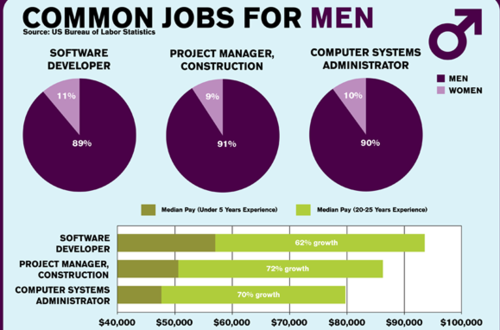
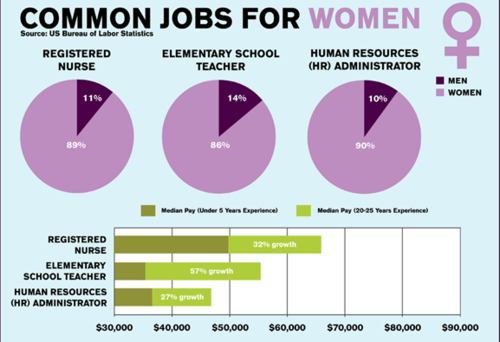
You can view the full infographic here: [x]
Clearly, we can see that women simply tend to choose lower-paying jobs.
Above is the most common and primary argument used to disprove the Wage Gap™ hypothesis: that it is not rooted in sexism, but in women’s choices and preferences.
However, I do agree with feminists who say that the inclination for lower-paying jobs doesn’t completely explain the cause. This is true, as there are actually several other factors involved.
I’ll be listing them all, sometimes in response to feminists’ rebuttals to the aforementioned primary argument.
1. WORKING HOURS
"What about women working the same jobs as men? The wage gap exists there too!"
Okay, so let’s look at this from a different angle. If a man and a woman are working the same job for the same wages, then where does the discrepancy occur? They’re both supposed to be earning equal hourly wages, right? That’s supposed to be the full-time wage.
So if a man works x hours a week and earns y salary, then a woman should also earn y salary for working for the same x hours a week.
Unless, of course, the woman works less than x hours a week.
According to the Wall Street Journal, men are about twice as likely to work 40 hours in one week, while women are twice as likely to work for about 35-39 hours a week.
Taken from last year’s official report released by US Bureau of Labor Statistics itself:
In general, employed women work fewer hours per weekWarren Farrell, who spent about 15 years going over U.S. Census statistics and research studies found that the wage gap exists not because of sexism, but because more men are willing to do certain kinds of jobs. "The average full-time working male works more than a full-time working female," Farrell said.
than men. On average, women worked 35.8 hours per week in 2012, compared with 40.8 hours for men.
2. EDUCATION
"Women are actually forced to take lower-paying jobs because they got rejected when they applied for higher-paying jobs!"
One factor that has not been counted in this claim is the kind of college degrees majority of either sex chooses.
Here we have common majors for each gender taken from Payscale.com
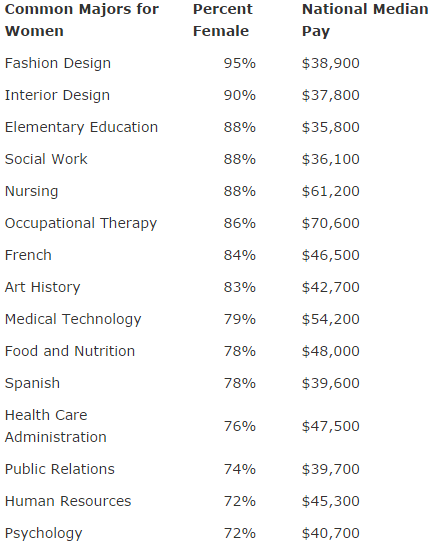
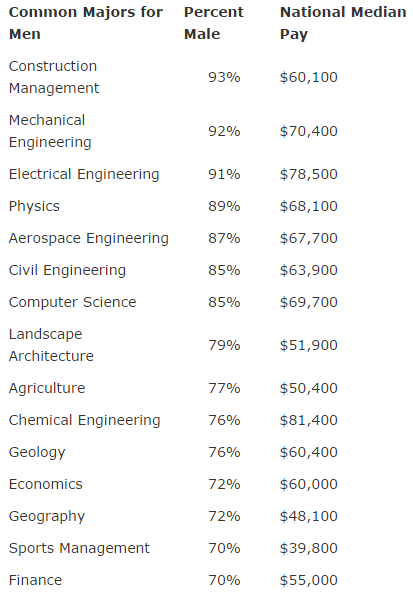
"As the above tables show, men are more likely to choose majors that lead to higher incomes. Only two majors common for women pay a national median pay over $60,000 (Nursing and Occupational Therapy), while 10 of the 15 common majors for men pay at least $60,000. The average pay across all of the common majors for men is $61,700, which is 35% higher than the average pay across the common female majors ($45,600).
"Therefore, as women tend to choose majors that lead to lower income, examining national median pay differences for all jobs across genders may just be reflecting these differing major choices. The above pay figures show that women commonly choose majors that come with lower salaries, thus leading (in part) to a lower national median pay for women.”
Women tend to participate in fields that pay relatively less on average. Keep in mind that these majors pay less to both men and women, and women simply focus on these majors on a much greater scale by numbers as compared to men.
3. PREGNANCY AND MOTHERHOOD
Leaving the job market during pregnancy
When the mother comes back to the job (market), she’ll have lesser work experience than most other men of the same age. Lesser work experience means lower chance of getting picked over other people with the same degree of education and age but with higher work experience.
Job options narrowed down to those that offer flexible hours
See, a woman with children will ideally prioritize her children, yes? So she’ll need to look for a job that offers flexible hours.
Unfortunately, not all jobs offer flexibility. So that diminishes job options to mostly flexible jobs. Usually, jobs that offer flexible hours will pay less, ceteris paribus, than those which don’t.
Married mothers as primary providers vs Single mothers
Married mothers opting to be the primary providers, will earn more than single mothers. (Joint filing vs individual taxes, being one of the reasons)
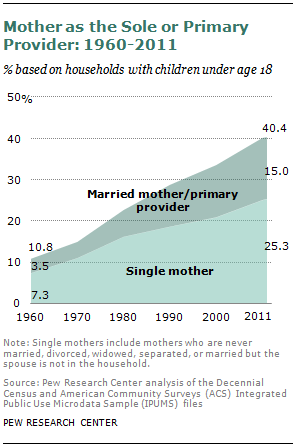
This here leads to another discrepancy: because 63% are single mothers, whereas the rest 37% are married mothers, yet married moms earn way more than their single counterparts.
Moreover, in case of married mothers, the total family income is higher when the mother, not the father, is the primary breadwinner.
4. GENDER-DOMINATED WORK FIELDS
"Men earn more than women in female-dominated fields!"
Actually, this goes both ways.
According to Forbes, women are earning ~8% more in male-dominated fields while holding only 3% of such jobs. Some researchers even claim that both sexes fare better when they are in the minority in any chosen field.
Inversely, there have been instances where women have earned more in female-dominated fields as well
On the opposite end of the spectrum, women also make more in a few female-dominated education and healthcare jobs. Female teacher assistants earn 105% as much as male peers. Women are 92% of the field and earn a median of $474 a week, compared to men’s $453.5. BIOLOGY AND PSYCHE
Women also earn more than men in higher paying jobs like occupational therapists, dieticians and nutritionists, and life, physical, social science and health technicians.
Other factors also include physical strength, which is needed for jobs like construction. Women are generally built with lesser physical strength than men, so job options in heavy-labour fields become diminutive for most.
There are also some psychological differences between men and women that can lead to a discrepancy. For example, women tend to prioritize childcare over profession, so they might drop out of the job market if they decide to start a family. This happens due to the biological instinct of a mother to nurture her children, so we cannot entirely place the blame on society.
That is why 57% of female graduates of Stanford and Harvard left the workforce within 15 years of entry into the workforce.
According to Bloomberg
And there’s no reason to think that women will ever, on average, have the same preferences as men about combining employment and parenthood, or that they will want to become librarians and truck drivers at the same rate as men.And according to some studies that show that brains of women and men are structurally different, they reported that
Among the differences, men tended to have larger volumes in brain regions understood to be associated with survival instincts, memory and learning, while women tended to have larger volumes in areas of the brain dealing with emotions. This reinforces some commonly held gender stereotypes about the historical roles of men and women.Another study published in the Proceedings of the National Academy of Sciences shows that
[…] colleagues found greater neural connectivity from front to back and within one hemisphere in males, suggesting their brains are structured to facilitate connectivity between perception and coordinated action. In contrast, in females, the wiring goes between the left and right hemispheres, suggesting that they facilitate communication between the analytical and intuition.—
For instance, on average, men are more likely better at learning and performing a single task at hand, like cycling or navigating directions, whereas women have superior memory and social cognition skills, making them more equipped for multitasking and creating solutions that work for a group. They have a mentalistic approach, so to speak.
Right now, along with our primary argument, we’ve covered some other factors that result in the Wage Gap™ which far outweigh and even diminish the case of it simply being a consequence of discrimination against women.
In conclusion, in order for there to be a gender pay gap, you need to have one gender being paid more than another, ceteris paribus.
But we’re not done yet, folks!
Some people claim that these facts aren’t ‘good enough’ and choose to attack from a more subjective point of view. They bring female socialization and gender roles into the mix, despite neither of these being measurable factors. Some have rejected the idea that women choose to work jobs that offer more comfort, low risk and high flexibility out of their own free will and instead argue that women have been raised and influenced by society to develop an inclination for jobs that coincidentally(imo) have low pay. Examples provided below.
"Women are socialized into taking low-paying jobs!"
Okay, let’s look at this from another angle. If taking low-paying jobs is indicative of socialization then what kind of job would not be seen as a result of socialization?
High-risk jobs? Because, considering the risk factor, they tend to pay the highest of salaries? You can thank
Human bridges? Meaning careers based in sociology, liberal arts or psychology. In fact, they appealed to
Higher availability of the aforementioned jobs in favour of women means that these jobs will become more lucrative to women seeking employment, regardless of whether they’re ‘ideal’ or not.
You see, in this age of unemployment, you tend to reach out for any job that’s available. And if the position of a teacher is more easily accessible
Another similar argument put forward by some feminists is:
"Women take jobs for low pay because they are groomed to be submissive and to believe that they are not worthy, intelligent, strong, etc!"
Tell me, dear friends, do you think a woman choosing to work as a kindergarten teacher is a sign of subservience? When in fact, she’ll probably find higher job satisfaction in that field of work than working in the more stressful environment faced by a surgeon?
Here, see what made Cosmo’s list of Best Jobs for Women. All of the options indicate a high level of job satisfaction.
Just because we have different lines of work that are dominated by either sex, it doesn’t mean that women choosing to work in a female-dominated field, sometimes for lesser pay, is a display of subservience. If anything, it’s a matter of convenience to choose a job with higher satisfaction levels than whatever’s supposed to be the so-called ideal job for your “strong, independent woman” archetype.
Moreover, if women are conditioned from birth to believe they are not worthy or intelligent then why do they tend to secure equal or even higher scores in subjects like math from a very young age? The conditioning clearly hasn’t affected their level of intelligence, nor their display of said intelligence in standardized tests, it seems. Does an off switch magically appear while they’re filling out college application forms?
The Wall Street Journal says
While feminists suggest that women are coerced into lower-paying job sectors, most women know that something else is often at work. Women gravitate toward jobs with fewer risks, more comfortable conditions, regular hours, more personal fulfillment and greater flexibility. Simply put, many women—not all, but enough to have a big impact on the statistics—are willing to trade higher pay for other desirable job characteristics.— Thoughts —
However, I do agree that all these factors I mentioned and the primary factor altogether may not be 100% of the cause for the Wage Gap™. Yes, some studies even suggest that anywhere from 5% - 40% of the cause of the difference remains unattributed.
Although, just because 5% to 40% of the cause is supposedly unknown, workplace discrimination itself cannot be accurately measured. So while there’s a possibility that discrimination can be a factor, it still doesn’t determine how major or minimal of an impact it has on the Wage Gap™.
I have yet to see any actual case studies regarding workplace discrimination against women that can be considered as hard evidence and has a quantitative function.
As a variable, discrimination/sexism itself can neither be measured, nor can it be controlled. So while it most certainly remains a possibility, there’s no reason to claim that it is a critical factor as compared to the actual factors I’ve posted.
Interestingly enough, a research piece from the economists at the New York Federal Reserve reported, in a survey
What does the phrase “treated poorly in jobs available…”If discrimination really is a widespread issue then it affects both sexes and not just women.
mean to you
Females reported: Women might be subject to jokes in strongly male-dominated fields, but men are more likely to be subject to worse treatment by female coworkers in strongly female-dominated fields. Poor treatment of women by men is much less socially acceptable than the reverse.
I suppose socialization and gender roles may affect your choice of career to some degree, but altogether that is purely arbitrary. It varies case by case and cannot be measured as a quantitative variable, so we cannot determine the extent to which it affects career choices.
There is no way to figure out if the career choice a woman makes is due to her being conditioned by society. Since this logic of gender roles applies to men too, yet we have men working in female-dominated fields.
If you want to go down the “society is evil” route then you must realize that it’s not a gendered issue. There are men who would be affected by it as well.
While I won’t outright reject these possibilities, I won’t count them as important factors either.
The Wage Gap™ issue needs much more evidence before it can be proven, rather than assertions.
Disclaimer: Regardless, I do think it’s a great idea to encourage more young girls to participate in the science and IT fields and inculcate leadership qualities… but they should not be forced to show interest.
We should not ignore biological differences between many girls and boys that occur right from infancy.
According to a study done by Cambridge University,
Results showed that the male infants showed a strongerHowever, we can’t ignore the notion that environment might play an important role too.
interest in the physical-mechanical mobile (physical-mechanical object) while the female infants showed a stronger interest in the face (social object). The results of this research clearly demonstrate that sex differences are in part biological in origin.
For example, it is reasonable to assume (as a possibility, not as a fact) that a kid growing up in a household full of lawyers might also go down that route due to heavy exposure to the field (opportunity to attend court trials, for example) at a very young or developmental stage.
But if the same child grows up to become a social worker instead, then is it because of socialization and adherence to gender roles, or is it simply due to some sort of mental inclination towards social education, as an expression of a certain personality type (pedagogic ENFJs, I’m looking at you)? Notice that I didn’t mention the gender of the child.
Either way, biology or the environment certainly can influence someone’s personality and decision-making ability but there’s no way of knowing which can be the bigger determinant simply by looking at their career choices.
Social influences are not a deciding factor, so we should respect a person’s career choice as a result of him/her exercising the ability to think independently. Saying that society influences women to be servile is disrespectful to those who didn’t go for the job suitable for the “strong, independent women” archetype simply due to a difference in personal interests and goals… so it’s not really helping your cause at all.
What’s interesting to note is that those who are in opposition or critical of a woman’s choice (to take jobs that offer relatively low pay) generally tend to be the ones who abstain from entering scientific or tech fields, both of which are higher-paying.
Not that I’m implying anything. :)
Another Disclaimer: Whatever’s mentioned under —Thoughts— is just that - my own opinion. You can either agree with it, or we can agree to disagree. Or we could discuss it privately if you’d like. Preferably as mature adults, thanks!
Sources(It’s advisable that you go through all of them before coming at me with a rake):
Equal Pay Act of 1963
http://www.presidency.ucsb.edu/ws/index.php?pid=9267#axzz1wmGnVeDf
Title VII of the Civil Rights Act of 1964
http://www.eeoc.gov/laws/statutes/titlevii.cfm
It’s Time That We End the Equal Pay Myth
http://www.forbes.com/sites/realspin/2012/04/16/its-time-that-we-end-the-equal-pay-myth/
Women in the Labor Force: A Databook by US Bureau of Labor Statistics (It’s over 100 pages long so have fun)
http://www.bls.gov/cps/wlf-databook-2013.pdf
Majors by Gender: Is It Bias or the Major that Determines Future Pay?
http://www.payscale.com/career-news/2009/12/do-men-or-women-choose-majors-to-maximize-income
The ‘77 Cents on the Dollar’ Myth About Women’s Pay
http://online.wsj.com/news/articles/SB10001424052702303532704579483752909957472
Study Shows That Numbers Of Working Moms Have Increased: Is That A Good Thing?
http://www.forbes.com/sites/kellyphillipserb/2013/05/31/study-shows-that-numbers-of-working-moms-have-increased-is-that-a-good-thing/
IRS Announces 2013 Tax Rates, Standard Deduction Amounts And More
http://www.forbes.com/sites/kellyphillipserb/2013/01/15/irs-announces-2013-tax-rates-standard-deduction-amounts-and-more/
Breadwinner Moms
http://www.pewsocialtrends.org/2013/05/29/breadwinner-moms/
The 15 Jobs Where Women Earn More Than Men
http://www.forbes.com/sites/jennagoudreau/2011/03/14/jobs-where-women-earn-more-than-men/
Women In Tech Make More Money And Land Better Jobs Than Men
http://www.businessinsider.com/women-in-tech-make-more-money-and-land-better-jobs-than-men-2010-9#ixzz35hfN4ydy
Young Women’s Pay Exceeds Male Peers’
http://online.wsj.com/news/articles/SB10001424052748704421104575463790770831192?mg=reno64-wsj&url=http%3A%2F%2Fonline.wsj.com%2Farticle%2FSB10001424052748704421104575463790770831192.html
Female U.S. corporate directors out-earn men: study
http://www.reuters.com/article/2007/11/07/us-boardroom-women-idUSN0752118220071107?feedType=R
Women CEOs Beat Men in Pay in 2009
http://abcnews.go.com/print?id=10630664
Don’t Blame Discrimination for Gender Wage Gap
http://www.bloombergview.com/articles/2012-08-13/don-t-blame-discrimination-for-gender-wage-gap
Obama’s 77-Cent Exaggeration
http://www.factcheck.org/2012/06/obamas-77-cent-exaggeration/
Federal Reserve Bank of New York
Staff Reports
http://www.newyorkfed.org/research/staff_reports/sr364.pdf
Young women now earn more than men in the UK
http://www.independent.co.uk/news/uk/home-news/young-women-now-earn-more-than-men-2364675.html
Women In Science: No Discrimination, Says Cornell Study
http://www.science20.com/news_articles/women_science_no_discrimination_says_cornell_study-75984
Let’s be real about the lack of women in tech
http://www.businessinsider.com/lets-be-real-about-the-lack-of-women-in-tech-2010-10?IR=T
An Analysis of Reasons for the Disparity in Wages Between Men and Women - CONSAD report (warning: 95 pages!)
http://www.consad.com/content/reports/Gender%20Wage%20Gap%20Final%20Report.pdf
Men’s and women’s brains found to be different sizes
http://www.nhs.uk/news/2014/02February/Pages/Mens-and-womens-brains-found-to-be-different-sizes.aspx
A meta-analysis of sex differences in human brain structure
http://ac.els-cdn.com/S0149763413003011/1-s2.0-S0149763413003011-main.pdf?_tid=1a9c3592-ffc4-11e3-bef2-00000aab0f6b&acdnat=1404070528_f3e4e1341a7a1de1c3707dd52b68a12d
Sex differences in human neonatal social perception - A Study by Cambridge U.
http://www.math.kth.se/matstat/gru/5b1501/F/sex.pdf
Children Less Than A Year Old Already Favour Gender-Typical Toys
http://www.medicalnewstoday.com/releases/185670.php
Brain Connectivity Study Reveals Striking Differences Between Men and Women
http://www.uphs.upenn.edu/news/News_Releases/2013/12/verma/




No comments:
Post a Comment